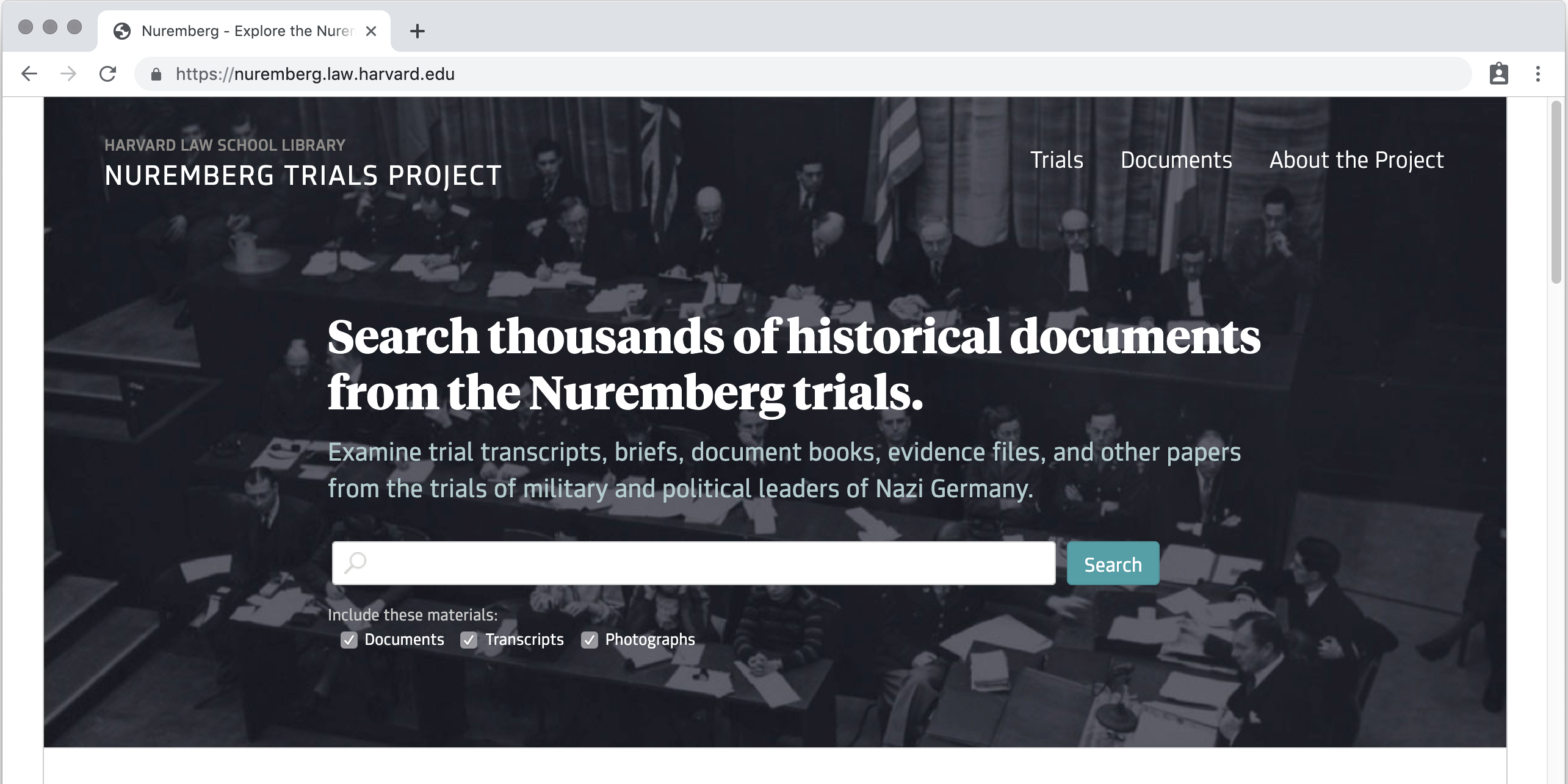Harvard Law School Library’s Nuremberg Trials Project reached a new milestone this summer when Judith Haran, one of two document analysts with the project, was invited to speak at the international conference “Holocaust Studies in the Digital Age: What’s New?”
The conference, held at the Stedelijk Museum in Amsterdam in July, explored how digital technology influences contemporary Holocaust research. In her presentation, Haran shared the current and future work of the Nuremberg Trials Project. Haran and Michael Haley Goldman of the U.S. Holocaust Memorial Museum were the only two U.S. presenters among the twelve invited speakers.
The Nuremberg trials, considered by many to be the most significant series of trials in history, were established to prosecute those in authority in the Nazi regime for war crimes and crimes against humanity, to document those atrocities so that a permanent historical record would be created, and to establish a standard of conduct acceptable in time of war. The Harvard Law School Library uniquely owns and manages approximately one million pages of documents relating to the trial of military and political leaders of Nazi Germany before the International Military Tribunal and the subsequent twelve trials of other accused Nazi war criminals before the United States Nuremberg Military Tribunals during the period 1945-49.
In her presentation, Haran discussed the overall history of the Nuremberg documents and the distribution in 1949 of the more than 100 tons of records to archives and libraries in Europe, Israel and the U.S. She shared the history of the Harvard Law School’s Nuremberg collection during its first five decades, and the library’s long road towards digitizing 750,000 pages out of the one million owned by HLS.
Haran also covered the features of HLS’ Nuremberg Trials Project website, detailed the role of document analysts, and discussed the issue of controlled vocabularies. She also shared HLS’s plans for the future of the Nuremberg Trials Project, including the use of a web-based platform for data entry, machine learning to extract names and topics from the trial documents, and the potential for linking HLS’s data with that of similar collections in the U.S. and abroad.
WATCH Treasures of the Harvard Law School Library: The Nuremberg Trials Documents
To preserve the contents of the Nuremberg Trials documents—which include trial transcripts and full trial exhibits—the Harvard Law School Library has undertaken a multi-stage digitization project to make the collection freely accessible online. This video offers a brief glimpse of the project and its dedicated staff.
The talk was well received and generated many questions. Many audience members approached Haran after her presentation to express thanks for putting these historically important documents online for the first time.
Dr. Gilly Carr of the University of Cambridge, who also presented at the conference, told Haran she was thrilled to receive digital copies from HLS of three prosecution documents from NMT Trial 8, “RuSHA Trial.” The NMT Trial 8 documents detail Germany’s attempt to “repatriate” women from the Channel Islands who had given birth to illegitimate children of German soldiers. For the past 12 years Carr has worked to research islanders’ experiences during the war, and she has helped create the Frank Falla Archive, the only online archive about WWII and the Channel Islands. Carr said that although she had heard about the Trial 8 documents for years, she had never seen them before HLS’s digitization.
Another speaker, Andrzej Grzegorczyk, a curator at Radegast Station, a division of the Museum of Independence Traditions, in Lodz, Poland, told Haran that he plans to use documents from Trial 3 in an upcoming exhibit at the museum.
Presentation topics at the conference ranged from “Geographies of accountability: the United Nations War Crimes Commission archives” to “The Danish Jews in Theresienstadt: Topography and Memory.” Another presentation, “The Arolsen Archives e-Guide,” explored the work of archivists at the Arolsen Archives, formerly the International Tracing Service, who have developed an “e-guide” to teach potential users about the array of documents now available on their website.
The conference was organized by the European Holocaust Research Infrastructure (EHRI). Founded in 2010, EHRI is a group of more than 20 organizations convened to support the Holocaust research community by building a digital infrastructure and facilitating human networks. Members include Yad Vashem, the U.S. Holocaust Memorial Museum, the Bundesarchiv in Germany, the Wiener Library in London, the Memorial de la Shoah in France, the Elie Wiesel Institute in Romania, and several others.
Related
An interview with Nuremberg prosecutor Benjamin Ferencz ’43
Ben Ferencz ’43, the last surviving Nuremberg prosecutor, has spent his life advocating for law, not war. In 1947, at the age of 27, Ferencz served as chief prosecutor for the United States in the Einsatzgruppen Case at the Nuremberg Tribunal, in which 22 Nazi officials, including six generals, were charged with murdering more than 1 million people. All were convicted, and 13 were sentenced to death. The International Military Tribunals at Nuremberg are widely regarded to have changed the course of history. The term “genocide” was coined during the tribunals and the concept of crimes against humanity began to emerge. In 2014, Ferencz, known for his role at Nuremberg and for his work promoting an international rule of law and the creation of an International Criminal Court, was awarded Harvard Law School’s highest honor: the Medal of Freedom. In this video, Ferencz reflects on his life’s work advocating for law, not war.
